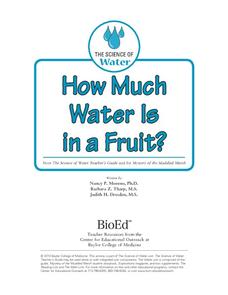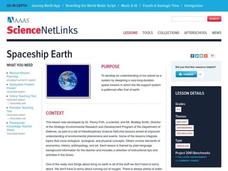Curated OER
Mr. Mascot's Magical Musical Tour
Young scholars explore particular places in the world. Students decipher clues that a class mascot leaves behind as it travels the world. Through researching the clues, young scholars discover geographical locations, elements of world...
Curated OER
Regarding the Fountain: Questioning Strategy—Cubing
Look deeper into the text with a reading strategy based on asking critical thinking questions. While reading Reading the Fountain by Kate Klise, learners think of questions that help them describe, compare, associate, analyze, apply, and...
Baylor College
Why Is Water Important? Pre-assessment
This water worksheet is just the tip of the iceberg! It a multiple-choice quiz meant to be a pre-assessment for a wonderful water unit. There are 10 questions to be answered regarding the role, properties, and behavior of water. Make...
Baylor College
How Much Water Is in a Fruit?
Compare the volume of an orange to the volume of liquid that can be extracted out of it. Also compare the mass of an apple before and after it has been dried out. In both of these activities, children find that there is an appreciable...
Baylor College
How Much Water Do Humans Need?
Physical or life science learners measure the amounts of water eliminated by intestines and the urinary system, and the amounts lost via respiration and perspiration. In doing so, they discover that the body's water must be replenished...
Baylor College
How Do We Use Water?
Send youngsters home to survey how they use water in their homes. Then bring them together to discuss which uses are essential for our health and which are not. A helpful video offers teaching tips for this lesson plan, and a...
Avi Writer
The Cross of Lead, At the Edge of the World, and The End of Time
A fan of Ari's Crispin trilogy? Here is a packet that contains study guides for all three Crispin novels: The Cross of Lead, At the Edge of the World, and The End of Time.
Rainforest Alliance
Protecting the Critical Habitat of the Manatee and Loggerhead Turtle
Explore ocean habitats with a lesson plan that showcases the home of manatees and loggerhead turtles in Belize. Here, pupils compare and contrast the homes of ocean animals to those of humans, listen to an original short story about the...
Chicago Botanic Garden
Preparing for Project BudBurst
Male deer growing antlers to begin the breeding season is an example of a phenological event. First in a four-part series is an activity requiring individuals to collect phenological data on their campus. Classes discuss phenology, the...
Chicago Botanic Garden
Preparing for Project BudBurst
Plants take cues from the environment—change in daylight hours and temperature—to complete their seasonal life cycles. Lesson four in the series of six has classes collect phenology data on plants. After taking initial observations,...
Curated OER
Spaceship Earth
Students develop an understanding of our planet as a system by designing a very-long-duration space mission in which the life-support system is patterned after that of earth.
National Endowment for the Humanities
Faulkner's As I Lay Dying: Burying Addie's Voice
Learners explore the use of voice and title in William Faulkner's, "As I Lay Dying". They identify and discuss the use of image, symbols and narrative voice in the story.
National Endowment for the Humanities
Faulkner's As I Lay Dying: Concluding the Novel
As I Lay Dying is a beautiful book and a wonderful vehicle for understanding, interpreting, and comparing themes. The class reads and analyzes the novel, discusses possible interpretations, and characterizations. They compare the themes...
Curated OER
Can't Wait - Gotta Migrate:The Monarch Butterfly
Students study the migratory behavior of the monarch butterfly and to carefully develop a scientific method for answering one question concerning their behavior. They perform many meaningful tasks which help them explain the Monarch...
Curated OER
Starfish Project: Ceramics
After exploring the wonders of ocean life found in tidal pools, explore ocean life through ceramic art. Kids use texturing and the pinch-and-pull technique to create starfish, just like the ones found at the seashore. Suggested...
Curated OER
Under the Sea - KWL Chart
Students create a KWL chart to start the discussion on ocean animals. They practice sorting the animals into their different classifications. They use indexes, table of contents and glossary to find information.
Curated OER
I Spy Poetry
Explore the components of rhythm and form through a reading of Jean Marzollo's I Spy books. After discussing Marzollo’s format, the class agrees upon a theme for a class book and topics that fit with that theme. Pupils write a poem,...
Curated OER
Portraits, Pears, and Perfect Landscapes: Investigating Genre in the Visual Arts
Students define genre in the visual arts, particularly in Western painting and explain the differences between subject and genre. The genre of a variety of works of art is identified.
National Endowment for the Humanities
Tales of the Supernatural
Scary stuff! Whether approached as the first horror story or a "serious imaginative exploration of the human condition," Frankenstein continues to engage readers. Here's a packet of activities that uses Mary Shelley's gothic novel to...
Monterey Bay Aquarium
What's in a Name?
Combine art and word analysis in a lesson about genus and species. Elementary children sleuth out the meaning of scientific names for a number of shark species using a prefix and suffix definition chart. They then draw an image of the...
PBS
Cardboard History
A PBS clip focused on collecting sports memorabilia launches this research project lesson. Class members then read Dan Gutman’s Honus and Me in which Wagner’s baseball card is used to time travel. The lesson ends with researchers...
Curated OER
Portraits, Pears, And Perfect Landscapes: Investigating Genre in the Visual Arts
Differentiate between the various genres in the visual arts world, particularly in Western painting. Your class can view and discuss, in small groups, paintings published on the National Galleries website. Then each student individually...
Curated OER
Super Science By Any Means Necessary!
The animated S2 Unit will use the adventures of a Super Hero and her sidekick to teach basic science and math concepts. Educators can use comic books, Saturday Morning Cartoons and the adventures of Super Heroes to teach a nine-week...
Curated OER
Remember This?
Students investigate the mechanics of an fMRI and the properties of neurons. In this biology lesson, students analyze the way the brain works by performing tests in the neurons in the brain. This is all done theoretically.
Other popular searches
- Mystery Genre
- Elements of Mystery
- Mystery Book Reports
- Mystery Box
- Mystery Genre 5th Grade
- Mystery Lesson Plans
- Nate the Great Mystery
- Mystery Story
- Coloring a Mystery Picture
- Mystery Plays
- Mystery Novels
- Mystery Story Starters

























